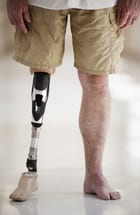Amputation
 Amputation is the removal of a limb or extremity: arm, leg, hand, foot, finger or toe. A treatment of last resort, it is performed only after all other forms of treatment have failed. It is used to treat severe infection, disease progression, removal of a tumor on a bone or muscle, or persistent pain. Before undergoing an amputation, a thorough physical examination is performed to verify that amputation is the only feasible option. The most common type of amputation is removal, either above or below the knee, of the leg.
Amputation is the removal of a limb or extremity: arm, leg, hand, foot, finger or toe. A treatment of last resort, it is performed only after all other forms of treatment have failed. It is used to treat severe infection, disease progression, removal of a tumor on a bone or muscle, or persistent pain. Before undergoing an amputation, a thorough physical examination is performed to verify that amputation is the only feasible option. The most common type of amputation is removal, either above or below the knee, of the leg.
Reasons for an Amputation
The primary reason for amputation is a lack of circulation, which can result from a variety of causes, in the affected limb or extremity. When blood vessels are damaged and do not permit normal blood flow to the extremities, tissue can die and infection set in. When infection cannot be controlled through antibiotics or debridement, which is the scraping away of diseased tissue, amputation may be unavoidable. Reasons an amputation are performed include the following:
- Prolonged constriction of the affected limb
- Traumatic accident
- Battlefield wound
- Spread of a disease process (such as malignancy or gangrene)
- Diabetes
- Atherosclerosis
- Peripheral artery disease (PAD)
- Frostbite
- Neuroma (nerve tumor)
Although patients with PAD are usually treated successfully in other ways, it is patients with this disorder, particularly those who also have diabetes, who have the great majority of amputations.
The Amputation Procedure
Amputation is a serious surgical procedure that usually requires either general or spinal anesthesia. Because of the trauma to the patient, general anesthesia may be preferred, particularly when a limb, rather than a digit, is removed. After amputation, the incision is either closed immediately or kept open for a few days until infection is no longer an issue.
Risks of an Amputation
As with any serious surgery, amputation has risks. Because amputations are, to a greater or lesser extent, psychologically as well as physically traumatic, the patient's mental state must also be addressed. Possible complications from amputation include the following:
- Contracture (permanent muscle/joint shortening)
- Infection
- Hematoma
- Phantom-limb pain
- Psychological distress
- Deep vein thrombosis
- Pulmonary embolism
- Joint deformity
- Infection
- Opening of the wound
- Necrosis (death of skin tissue)
Excessive bleeding is also a possible complication of amputation.
Recovery from Amputation
Although the hospital stay for an amputation may be relatively short, the recuperative period is longer, involving as it does both physical and psychological rehabilitation, and adjustment to altered mobility or dexterity. In most cases, amputation also requires postsurgical adjustment to a prosthetic device. At times, due to the trauma of having a body part removed, the patient has a severe psychological reaction. Because emotional issues can interfere with healing and overall health, psychotherapy or psychotropic medication may be necessary.
A hospital stay of 1 to 2 weeks is usually required after an amputation. During this time, the site is monitored to verify that proper healing is taking place. Prescription painkillers are administered as necessary during the recovery period. As soon as sufficient healing has taken place, the patient begins physical therapy to learn how to perform the day-to-day tasks that involved the amputated body part. In many cases, the patient, when sufficiently healed, is fitted with a prosthesis, a device that replaces the amputated body part, and then given therapeutic instruction on how to use it.
In rare instances, it may be possible for an amputee to have a limb transplanted from a donor's body. This involves extremely complex surgery and rehabilitation, but can be successful. If a limb is successfully transplanted, anti-rejection medications must be taken for the remainder of the recipient's life. There are also unusual cases in which a patient's own digits are transplanted to another part of the body where they will be more useful.
For more information about Amputation, Call Rodney Bland's office at (757) 517-0465.
